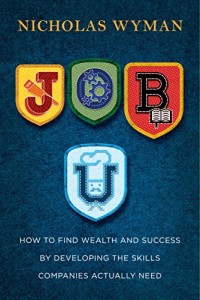Behind the Book: Q&A with Job U Author Nicholas Wyman
Posted by Elizabeth Lee on Dec 15, 2014
 Fifty-three percent of recent college graduates are unemployed or underemployed, yet 3.5 million jobs remain unfilled. Nicholas Wyman, the CEO of the Institute for Workplace Skills and Innovation, believes that these numbers show an unprecedented opportunity for every worker. These opportunities, he argues, cannot be find inside a traditional classroom. They are found in alternatives that equip job-seekers with the skills most valued in today's job market: technical and vocational education, apprenticeships, online and on-the-job training and more. His upcoming book, Job U, shows how non-traditional education helps individuals obtain their "dream jobs" in ways that traditional classrooms cannot. In this exclusive Q&A with Wyman, learn about the why he believes in nontraditional education and why you should too.
Fifty-three percent of recent college graduates are unemployed or underemployed, yet 3.5 million jobs remain unfilled. Nicholas Wyman, the CEO of the Institute for Workplace Skills and Innovation, believes that these numbers show an unprecedented opportunity for every worker. These opportunities, he argues, cannot be find inside a traditional classroom. They are found in alternatives that equip job-seekers with the skills most valued in today's job market: technical and vocational education, apprenticeships, online and on-the-job training and more. His upcoming book, Job U, shows how non-traditional education helps individuals obtain their "dream jobs" in ways that traditional classrooms cannot. In this exclusive Q&A with Wyman, learn about the why he believes in nontraditional education and why you should too.
Q: How do you suggest we overcome the stigma surrounding vocational schools and associate degrees? Do you believe our society has already made some progress in the right direction?
A: With student loan debt hitting 1.2 trillion dollars, people are understandably looking for alternative pathways to successful and rewarding careers. There has been some stigma with vocational pathways, seen by some as dirty, low-paid, menial work. The opposite couldn’t be more true. Apprenticeship has an impressive track record in countries like Switzerland and Germany, where it has been a huge factor in keeping unemployment rates low and economies healthy. Yet despite all its proven benefits — for companies and workers alike — it hasn’t been as fully embraced everywhere, and that needs to change.
Q: What advice would you give to someone who has no idea what career path to choose?
A: Wherever you are in life — whether you are approaching the school-to-work transition, reentering the workforce or contemplating a change from one career to another — Job U was written to provide you with both the practical tools and the inspiration to make your work life more fulfilling and financially rewarding. Of course, no two people are the same, nor will they travel the exact same path. The book introduces you to the broadest range of people — people of all ages, backgrounds and hailing from all corners of the country — who seized these opportunities and followed their dreams.
Q: How can we convince more companies to get on board with apprenticeship and training programs?
A: A customized, progressive apprenticeship program is a proven method for quickly upskilling and retaining top talent for the long-term. Employers earn a 36 percent return on their investments in apprentice training — higher than just about any investment a company can earn on its capital and far higher than the 10 percent typical among S&P 500 firms.
Q: What are your thoughts on working and training abroad (internationally) to gain experience?
A: A gap year or longer can really help develop a persons “real world” skills. What I would advise is that if people have a particular career interest, use this time to gain some practical front-line experience. So of you’re interested in a career in IT, try and secure some work in the related industry. Employers will look favorably on people who have some “real world” work experience, particularly in the age of globalization.
Q: What are your predictions for the United States workforce over the next decade?
A: The Chinese economy just overtook the United States economy to become the largest in the world. Barriers to entry are gone and many companies will source the highest skilled labor from wherever they can get it. So skilling up and investing in attracting, training and developing skilled employees is now more important than ever. For employees, this presents unprecedented opportunities to enter new and emerging industries.
Q: How can universities and colleges further prepare students for the workforce and provide them with more direction?
A: It’s critical that educators connect in a coordinated way with industry. One example of strong educational-industry partnerships is the Pathways in Technology or ‘P-TECH’ Model that is ensuring people have the right skills to meet the changing needs driven by globalization and technological change. Closing the skills gap, or the gap between people without jobs and jobs without people, is a challenge of our time. Many universities and colleges are proactive in preparing students with both strong academic knowledge and “real world” skills.
Job U is a general business book that focuses on America's education system and skills development. Ideal for a variety of readers, from high school teens to unemployed adults, this business book is a practical career resource that will show how you can equip yourself with the skills most valued in today's job market. Pre-order this business book in bulk today from BookPal, the leading eBook and book wholesale distributor. Browse BookPal's online catalog to find more business books wholesale.

